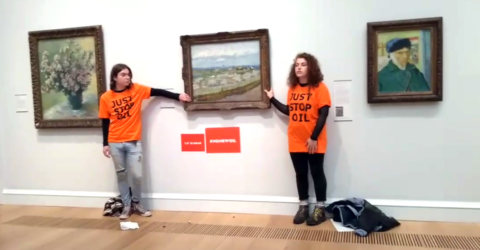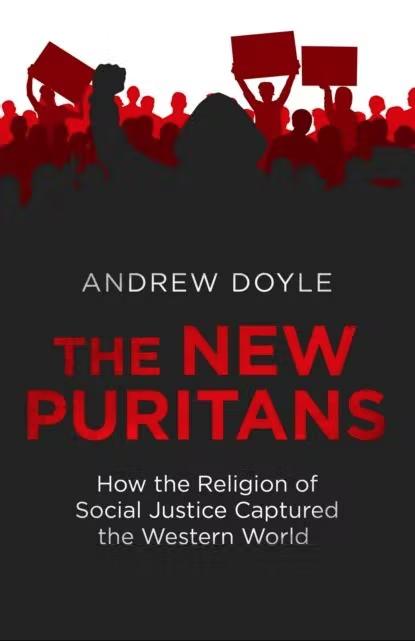While true of the puritanical organic lobby, a Supersized ethical position is also advanced by all too many Christians. Indeed, this is where the green-thinkers derive their theology in the first place. Gluttonous McDonald’s visits are on a long list that includes some items mentioned once or twice in scripture such as gay sex, polycotton and women letting their hair down in church and plenty of things from cocaine to coffee which are nowhere to be found in the Bible. The notion is that some things, while pleasurable, will prevent your immortal soul from making it to heaven and that for your own good you must be prevented from enjoying them. That this makes a nonsense of free will, shows precious little faith in the free gift of Grace and that some “sins” are singled out for hysterical attention while most are ignored entirely does not bother puritans historical or contemporary. And the fact most people worship at a different altar altogether does not cross their minds at all.
Ghost of a Flea, “Religion in general”, Ghost of a Flea, 2005-04-13.
March 31, 2024
QotD: Sins and “sins”
March 15, 2024
Woke Shakespeare?
Andrew Doyle wonders if even the Bard can survive the incessant assaults of the ultra woke, the new Puritans:

This was long thought to be the only portrait of William Shakespeare that had any claim to have been painted from life, until another possible life portrait, the Cobbe portrait, was revealed in 2009. The portrait is known as the “Chandos portrait” after a previous owner, James Brydges, 1st Duke of Chandos. It was the first portrait to be acquired by the National Portrait Gallery in 1856. The artist may be by a painter called John Taylor who was an important member of the Painter-Stainers’ Company.
National Portrait Gallery image via Wikimedia Commons.
The puritans had it in for Shakespeare. With the exception of the plague, they were perhaps the most persistent threat to his livelihood. As far as these zealots were concerned, the theatre was a realm of “adulterers, adulteresses, whoremasters, whores, bawds, panders, ruffians, roarers, drunkards, prodigals, cheaters, idle, infamous, base, profane, and godless persons”.
These were the words of the polemicist William Prynne from his Histrio-Mastix (1633). He was eventually to get his way in 1642 when the puritan-led parliament shut the theatres down. When the ban was lifted on the accession of Charles II, older plays had to be dusted off to satisfy the public’s appetite for drama. It was Shakespeare’s work that proved to be the most popular, establishing a trend that has never waned.
Now the bard faces another breed of puritan, more censorial than the last. We are living in conformist times, and inexplicably those in the creative arts have turned out to the be most conformist of all. Nowhere is this more evident than the theatre industry, where wrongthink is outlawed and artistic freedom is sacrificed on the altar of identity politics. Virtually all productions of Shakespeare’s plays I have seen in recent years have been mangled to promote the regressive fashions of our time. Today’s audiences are seeing a vague shadow of these masterworks through a narrow and uninspiring prism.
Even so, many of us are reluctant to give up on the theatre altogether. We tolerate the gender-neutral toilets that nobody asked for, the rainbow lanyards worn by ushers, and the little sermons in the programmes by directors who think their job is to educate the masses. One friend remarked that so long as the preaching only amounts to 20% of the show’s content, he is willing to accept it. I suppose it’s like going for dinner in an especially pious household, and having to put up with a long-winded prayer before a delicious meal.
Theatregoers might have a better experience if they opt for productions of plays written many years before this new state religion took hold. Shakespeare, as a playwright who has never been bettered, is surely the safest choice. In his work we find ourselves unmolested by ideology. We know nothing of Shakespeare’s opinions on matters of politics or religion, and attempting to glean any suggestions from his works is futile. I think A. L. Rowse put it best when he pointed out that Shakespeare “saw through everybody equally”. Neither prince nor pauper escapes his sceptical gaze.
December 25, 2023
QotD: Washington Irving and American Christmas traditions
… the man who did more than any other US citizen to shape the American Christmas. I am not sure how many people read Washington Irving these days, but I would wager that a large proportion of those who don’t are still vaguely familiar with his creation Rip van Winkle — and, if only through his memorialization in institutions like the New York Knicks, his fictitious Dutch historian Diedrich Knickerbocker.
An even larger number may be unaware of how much they’re honoring Mr Irving in their Christmas jubilations. He it was who, in the 1812 edition of his History of New York, threw in a whimsical vignette in which St Nicholas flies over the treetops in a wagon while puffing on his pipe. No reindeer, but all the other elements of the American Santa are there.
Washington Irving loved the great village revelries of the old English Christmas, which the Puritans had left far behind them when they landed at Plimouth Plantation. The parlor games and community feasting and the notion of the Saviour’s birth as a cause of merriment all appealed to him. In his famous and bestselling Sketch Book of 1819-1820 five chapters are devoted to lovingly detailed scenes from an English family Christmas as observed by a young visitor, and they proved so popular that half-a-century later (by which time almost all the elements had been imported into American life) they were published as a stand-alone book.
Mark Steyn, “Dangling Hares and Rosy-Cheeked Schoolboys”, SteynOnline, 2021-12-20.
October 28, 2023
QotD: Deposing King Charles I
It’s 1642, and once again the English are contemplating deposing a king for incompetence. Alas, the Reformation forces the rebels to confront the issue the deposers of Edward II and Richard II could duck: Divine sanction. The Lords Appellant could very strongly imply that Richard II had lost “the mandate of heaven” (to import an exoteric term for clarity), but they didn’t have to say it – indeed, culturally they couldn’t say it. The Parliamentarians had the opposite problem – not only could they say it, they had to, since the linchpin of Charles I’s incompetence was, in their eyes, his cack-handed efforts to “reform” religious practice in his kingdoms.
But on the other hand, if they win the ensuing civil war, that must mean that God’s anointed is … Oliver Cromwell, which is a notion none of them, least of all Oliver Cromwell, was prepared to accept. Moreover, that would make the civil war an explicitly religious war, and as the endemic violence of the last century had so clearly shown, there’s simply no way to win a religious war (recall that the ructions leading up to the English Civil War overlapped with the last, nastiest phase of the Thirty Years’ War, and that everyone had a gripe against Charles for getting involved, or not, in the fight for the One True Faith on the Continent).
The solution the English rebels came up with, you’ll recall, was to execute Charles I for treason. Against the country he was king of.
Severian, “Inertia and Incompetence”, Founding Questions, 2020-12-25.
October 4, 2023
QotD: The Witchburning and the “Mandate of Heaven”
Turning to more familiar Western examples, look at Germany, especially in contrast to England. Germany was on the forefront of every big social and economic change in the late Middle Ages, but you couldn’t blame their rulers for not handling it, because they didn’t have any. The minor princely states, the Electors of the Holy Roman Emperor, the Emperor himself, the Hanseatic League, and what have you — what could any of them do in the face of plagues and economic dislocations and terminal papal corruption and the massive intellectual upheaval of the printing press, even if their authority extended more than a few miles in any given direction, which it didn’t?
So they burned witches. The “European Witch Craze” of the 15th century has been a feminist bugbear for a long time, and one must naturally assume that pretty much all modern scholarship on it is uber-politicized hooey1, but it’s clear that there really were a lot of witch burnings in Germany in the 1400s. All that free-floating anxiety has to land somewhere, and since it’s pointless to blame the Margrave — he of the one decrepit castle and three square miles of territory — “witches” are a prime target. See also “the Period of the Wars of Religion” — is it any surprise that the most famous witchcraft stuff came from Germany just before the Reformation, or France in the depths of the religious wars, or England around the Civil War?
Clearly something is wrong with the universe – the Mandate of Heaven has been lost, not by any individual ruler necessarily, but by society. “Purity spirals” are also characteristic of these periods, and they quickly spiral out of control — see e.g. the Anabaptist Commune at Munster, or of course the Puritans.
Speaking of, the most famous-to-Americans example is the Salem Trials, and here we see all the trends converge. Not that the Puritans of Plymouth Bay would be so hubristic as to claim the Mantle of Heaven for themselves — Puritans were nothing if not ostentatiously self-effacing — but claim it they did, in deed if not in word, since Plymouth Bay was the closest thing one will ever get to a theocracy this side of Calvin’s Geneva (they burned their “witches”, too). And they just as clearly lost the Mandate — economic dislocations, a devastating Indian war brought about largely by their own hubristic incompetence, even a plague.
The aftermath of all this is fascinating. COVID, of course, is our new witch panic, and feel free to prognosticate on our current situation based on the life of Cotton Mather. The colony’s hottest young intellectual superstar in 1693, he went all-in on “spectral evidence” and the like, and by 1700 he was a joke on both sides of the Atlantic. So, too, with “critical race theory” and all the rest. There’s a racial awakening happening, kameraden, no doubt about that, but it has nothing to do with the eggheads’ fantasies. Those are just witch panics, and while witch panics are devastating to those caught in them, the wheel always turns sooner than later …
Severian, “Witch Trial Syndrome”, Rotten Chestnuts, 2021-01-27.
1. Which was also true of earlier scholarship, most famously Miss Murray’s The Witch-Cult in Western Europe, which is Marxist economics-level disproven, but still fervently believed by “Wiccans” everywhere.
June 5, 2023
“… if I were a teenager and I read on a cigarette the words, ‘Poison in every puff!’ I’d think it was a catchy marketing jingle”
Christopher Gage on the Canadian government’s ludicrous next anti-smoking campaign, putting scary messages on every single cigarette in a pack:
I resisted smoking until age ten. Back then, the local boys and I would tramp over the local fields in search of dried ferns upon which to practise the deadly, seductive art of smoking.
By high school, we’d graduated onto the proper cancer sticks. Every morning, we’d pool together our lunch money, and skulk outside the off-license in wait for a nameless reprobate to slip into the shop and, for buyer’s rights of one cigarette, smuggle us ten Lambert and Butler.
Since then, save four years of misguided, anti-smoking zealotry, I’ve smoked with a sinful enthusiasm. Few share my woeful pursuit.
This week, Canada announced a “world-first”. They’ll soon begin printing health warnings directly onto cigarettes.
Neophiles with an addiction to “progress” laud this wearisome world-first. Giddy are the pink-lunged puritans.
Sorry to be facetious, but if I were a teenager and I read on a cigarette the words, “Poison in every puff!” I’d think it was a catchy marketing jingle. I’d happily sign up for a lifetime of chuffing away my health.
Perhaps they should market specifically to Millennials. “Who cares? You’ll never buy your own home,” is particularly resonant.
This is all part of a scheme to cut smoking rates to below five percent by 2035.
Reader, what happens then? Once the health fascists defeat us smokers, from whom shall they siphon their righteous fix?
The irony: as smoking declines, obesity balloons. Between 2003 and 2017, obesity deaths spiked by a third. One in four deaths is now related to one’s weight. Corpulence chalks more bodies than the cancer stick.
I’m yet to see a warning label plastered on the side of a family bucket of KFC. But give it time.
You can live as long as you like, as long as you don’t like living.
June 1, 2023
May 29, 2023
“I’m starting to think that Just Stop Oil is a Big Oil plant”
Tom Slater on the amazing tone-deafness of the Just Stop Oil “activists”:

“Just Stop Oil Courtauld Gallery 30062022” by Just Stop Oil is licensed under CC BY-SA 4.0 .
I’m starting to think that Just Stop Oil is a Big Oil plant. What else could explain these campaigners’ phenomenal ability to turn the public against them and confirm their critics’ worst prejudices. Namely, that this environmental activism / amdram troupe is stuffed with upper-middle-class irritants who couldn’t give a damn about working-class people. Surely, this has got to be on purpose?
Take their recent “slow marches” through London, aimed at bringing traffic to a standstill. The whole point of these stunts seems to be to force cab drivers, delivery men and builders to sit in traffic so that these protesters can preach their miserable little gospel. And as Edred Whittingham‘s (don’t laugh) deranged antics at the Crucible recently showed us, you now can’t even escape these bourgeois millenarians during your leisure time.
That this new generation of environmentalists are almost uniformly posh is an established empirical fact. An academic survey of those involved in Extinction Rebellion – the mothership organisation from which Just Stop Oil and Insulate Britain were spawned – found, to the surprise of precisely no one, that they were overwhelmingly middle class, highly educated and from the south. A full 85 per cent of them have some form of university degree.
So what we have here is the comfortably off classes – those with sufficient free time to glue themselves to roads on a Wednesday mid-morning – forcing their weird hangups on everyone else. Time and again, when they are criticised for making people’s lives a misery, they offer only patronising lectures. “We’re so sorry that we have to disrupt the lives of ordinary people”, said Just Stop Oil’s Eben Lazarus (I know) to Vice last year, but “hopefully people will see, further down the line, that the disruption we’re causing is microscopic compared to the disruption that we’re going to face because of the climate crisis”. Translation: we know better, you cretins.
No wonder that so many now respond to these cunning stunts with instant, visceral fury. First there was the Battle of Canning Town in 2019, when east-London commuters pulled two Extinction Rebellion people down from the top of a Tube train. And as police have failed to deal with these protests – they now seem to escort rather than stop these “slow marches” – motorists have increasingly decided to take matters into their own hands. Several clips of workers clashing – sometimes physically – with Just Stop Oil activists have gone viral in the past week alone, including one of a man shoving JSOers on Blackfriars Bridge, before promptly being arrested.
The high-water mark of the Vegan cult?
In Spiked, Patrick West celebrates the passing of peak food puritanism:

“Welcome to Las Vegans and Vegetarian, Whole Foods fake meat section, Las Vegas, NV, USA” by gruntzooki is licensed under CC BY-SA 2.0 .
Over the past few years, there has been an explosion of vegan processed food appearing in supermarkets. A growing number of the population also claims to be vegan. But there are signs this trend could be going into reverse. Demand for animal-free food and drink products has collapsed over the past year. One casualty is Swedish oat-milk firm Oatly, which has recently withdrawn its dairy-free ice cream in the UK. Another is the Yorkshire sausage-making company, Heck, which has scaled-down its vegan-friendly range from 10 products to two. Smoothie-maker Innocent discontinued its dairy-free range earlier this year. Supermarket sales of meat-free products fell by £37.3million between September 2021 and September 2022, according to the consumer intelligence firm NielsenIQ.
There seems to be two main reasons. Rising inflation has been cited as one cause, as consumers have scaled back on branded and luxury eatables. Plant-based processed foods are generally more costly than the meat and dairy products they purport to replace. Another explanation is that producers of vegan food may have overestimated the size of the market for veganism, and now they are having to readjust to reality.
Whatever the reasons, we should welcome the retreat of the cult of veganism. And I use the word cult deliberately, because veganism greatly resembles not so much a lifestyle choice, but a way of life itself. It’s a faith that resonates with today’s puritanical and conformist mood.
And I should know, as someone who became a vegetarian in 1996 and has not eaten meat since. Sure, my decision aroused some mockery and derision back then, but vegetarianism had mostly stopped being regarded as weird by the mid-1990s. Ever since then, most of the opprobrium and scolding we vegetarians face comes from vegans, largely because we continue to eat eggs, cheese and milk.
For vegans, nothing must be consumed or worn that derives from animals or insects – even if there is no killing or discernible harm involved. Anything else is a feeble cop-out. Their way of thinking is absolute. In this respect, the best exemplars of the vegan movement are the animal-rights fundamentalists, PETA, whose members are well-known for their shrill, exhibitionist narcissism. Their message is simple: they are better people than you.
It’s no surprise that veganism was turbo-charged in the mid-2010s, when wokery captured the minds of so many – when absolutist, extreme thinking, and the competition to be purer than the next man or woman, took over. The trans movement echoes this rush to extremes. It demands the transformation of your entire body. Indeed, bodily self-mutilation and mortification of the flesh have long been practised by religious fundamentalists.
November 30, 2022
QotD: The rise of liberalism
Liberalism, in its own turn, came out of the accidents of European reformations, revolts, and revolutions, in an existing polity of hundreds of more or less independent political units, such as the Dutch cities in their Golden Age, or the Kleinstaaterei of German polities even after 1648. The success of the accidents made people bold — not necessarily and logically, but contingently and factually. For example, the Dutch Revolt 1568–1648 imparted the idea of civic autonomy against the hegemon of the time, Spain, and by analogy against other hegemons international and local. For another example, the initial successes of the English Civil War of the 1640s made ordinary people think they could make the world anew. For still another example, the Radical Reformation of Anabaptists, Mennonites, Congregationalists, and later the Quakers and Methodists let people take charge of their own religious lives, and by analogy their economic lives. The tiny group of English Quakers made for Lloyd’s insurance, Barclay’s bank, Cadbury’s chocolate. It was in the religious case not the doctrines of Calvinism as such (not the Protestant ethic and the spirit of capitalism) but a flattened church governance that mattered for inspiriting people.
In sum, as one of the Levellers in the English Civil War of the 1640s, Richard Rumbold, said from the scaffold in 1685, “there was no man born marked of God above another, for none comes into the world with a saddle on his back, neither any booted and spurred to ride him.” It was a shocking thought in a hierarchical society. In 1685 the crowd gathered to see Rumbold hanged surely laughed at such a sentiment. By 1885 it was a solemn cliché.
Dierdre McCloskey, “How Growth Happens: Liberalism, Innovism, and the Great Enrichment (Preliminary version)” [PDF], 2018-11-29.
November 22, 2022
November 21, 2022
November 14, 2022
QotD: The first modern revolution
The first modern revolution was neither French nor American, but English. Long before Louis XVI went to the guillotine, or Washington crossed the Delaware, the country which later became renowned for stiff upper lips and proper tea went to war with itself, killed its king, replaced its monarchy with a republican government and unleashed a religious revolution which sought to scorch away the old world in God’s purifying fire.
One of the dark little secrets of my past is my teenage membership of the English Civil War Society. I spent weekends dressed in 17th-century costumes and oversized helmets, lined up in fields or on medieval streets, re-enacting battles from the 1640s. I still have my old breeches in the loft, and the pewter tankard I would drink beer from afterwards with a load of large, bearded men who, just for a day or two, had allowed themselves to be transported back in time.
I was a pikeman in John Bright’s Regiment of Foote, a genuine regiment in the parliamentary army. We were a Leveller regiment, which is to say that this part of the army was politically radical. For the Levellers, the end of the monarchy was to be just the beginning. They aimed to “sett all things straight, and rayse a parity and community in the kingdom”. Among their varied demands were universal suffrage, religious freedom and something approaching modern parliamentary democracy.
The Levellers were far from alone in their ambitions to remake the former Kingdom. Ranters, Seekers, Diggers, Fifth Monarchists, Quakers, Muggletonians: suddenly the country was blooming with radical sects offering idealistic visions of utopian Christian brotherhood. In his classic study of the English Revolution, The World Turned Upside Down, historian Christopher Hill quotes Lawrence Clarkson, leader of the Ranters, who offered a radical interpretation of the Christian Gospel. There was no afterlife, said Clarkson; only the present mattered, and in the present all people should be equal, as they were in the eyes of God:
“Swearing i’th light, gloriously”, and “wanton kisses”, may help to liberate us from the repressive ethic which our masters are trying to impose on us — a regime in which property is more important than life, marriage than love, faith in a wicked God than the charity which the Christ in us teaches.
Modernise Clarkson’s language and he could have been speaking in the Sixties rather than the 1640s. Needless to say, his vision of free love and free religion, like the Leveller vision of universal equality, was neither shared nor enacted by those at the apex of the social pyramid. But though Cromwell’s Protectorate, and later the restored monarchy, attempted to maintain the social order, forces had been unleashed which would change England and the wider world entirely. Some celebrated this fact, others feared it, but in their hearts everyone could sense the truth that Gerard Winstanley, leader of the Diggers, was prepared to openly declare: “The old world … is running up like parchment in the fire”.
Paul Kingsnorth, “The West needs to grow up”, UnHerd, 2022-07-29.
October 16, 2022
The concept of “childhood” changes over time
Chris Bray on the steady changes in how adult societies have viewed their children from the “better whipped than damned” views of the Puritans to the “childhood is sexy” views of today’s avante-garde opinion pushers:
Childhood is mercury.
Puritans thought that children were born in a state of profound corruption, marked by Original Sin. Infants cry and toddlers mope and disobey because they’re fallen, and haven’t had the time and the training to grow into any higher character. The devil is in them, literally. And so the first task of the Puritan parent was “will-breaking”, the act of crushing the natural depravity of the selfish and amoral infant. A child was “better whipped than damned”, in need of the firm and steady repression of his natural depravity. Proper parenting was cold and distant; parents were to instruct.
By the back half of the 19th century, children were sweet creatures, born in a state of natural innocence, until the depravity of society destroyed their gentle character. (“Man is born free, and everywhere he is in chains.”) Meanwhile, the decline of family-centered industry changed the household. The historical father, present all day on the family farm and guiding his children with patriarchal modeling and moral instruction, left for work at the factory or the office, and mom occupied “the women’s sphere“, the nurturing home.
Depraved infants, stern and firm parents; innocent children, nurturing mothers. Those two conceptions of childhood and the family can be found less than a hundred years apart at their edges. There are some other pieces to layer into that story, and see also the last thing I wrote here about the history of childhood. But the briefest version of an explanation is that the changing idea of what it meant to be a child was a reflection of growing affluence and security: Calvinist religious dissenters living hard and unstable lives viewed childhood darkly, while the apotheosis of Romantic childhood appeared in the homes of the emerging Victorian management class.
So childhood is mercury: It moves and morphs with societal changes, becoming a different thing in different cultures and economies. It tells you what the temperature is.
In the febrile cultural implosion of 2022, childhood is sexy, and legislators work hard to make sure 12 year-olds can manage their STDs without the interference of their stupid clingy parents.
Or click on this link to see a fun story about a teacher in Alabama who has a sideline as a drag queen, reading a story to young children about a dog who digs up a bone and then cleverly telling the children, “Everybody loves a big bone.” Wink wink! I mean, really, what could be sexier or more fun than talking to very young children about thick adult erections, amirite?
Update: Corrected link.
September 14, 2022
QotD: The Wars of Religion and the (eventual) Peace of Westphalia
Thomas Hobbes blamed the English Civil War on “ghostly authority”. Where the Bible is unclear, the crowd of simple believers will follow the most charismatic preacher. This means that religious wars are both inevitable, and impossible to end. Hobbes was born in 1588 — right in the middle of the Period of the Wars of Religion — and lived another 30 years after the Peace of Westphalia, so he knew what he was talking about.
There’s simply no possible compromise with an opponent who thinks you’re in league with the Devil, if not the literal Antichrist. Nothing Charles I could have done would’ve satisfied the Puritans sufficient for him to remain their king, because even if he did everything they demanded — divorced his Catholic wife, basically turned the Church of England into the Presbyterian Kirk, gave up all but his personal feudal revenues — the very act of doing these things would’ve made his “kingship” meaningless. No English king can turn over one of the fundamental duties of state to Scottish churchwardens and still remain King of England.
This was the basic problem confronting all the combatants in the various Wars of Religion, from the Peasants’ War to the Thirty Years’ War. No matter what the guy with the crown does, he’s illegitimate. It took an entirely new theory of state power, developed over more than 100 years, to finally end the Wars of Religion. In case your Early Modern history is a little rusty, that was the Peace of Westphalia (1648), and it established the modern(-ish) sovereign nation-state. The king is the king because he’s the king; matters of religious conscience are not a sufficient casus belli between states, or for rebellion within states. Cuius regio, eius religio, as the Peace of Augsburg put it — the prince’s religion is the official state religion — and if you don’t like it, move. But since the Peace of Westphalia also made heads of state responsible for the actions of their nationals abroad, the prince had a vested interest in keeping private consciences private.
I wrote “a new theory of state power”, and it’s true, the philosophy behind the Peace of Westphalia was new, but that’s not what ended the violence. What did, quite simply, was exhaustion. The Thirty Years’ War was as devastating to “Germany” as World War I, and all combatants in all nations took tremendous losses. Sweden’s king died in combat, France got huge swathes of its territory devastated (after entering the war on the Protestant side), Spain’s power was permanently broken, and the Holy Roman Empire all but ceased to exist. In short, it was one of the most devastating conflicts in human history. They didn’t stop fighting because they finally wised up; they stopped fighting because they were physically incapable of continuing.
The problem, though, is that the idea of cuius regio, eius religio was never repudiated. European powers didn’t fight each other over different strands of Christianity anymore, but they replaced it with an even more virulent religion, nationalism.
Severian, <--–>”Arguing with God”, Rotten Chestnuts, 2020-01-20.






